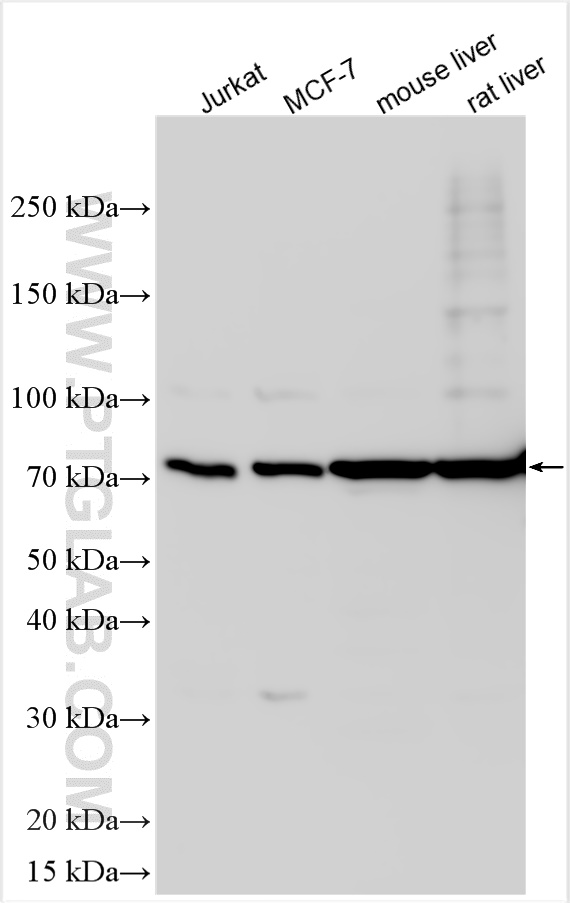ANGPTL1 Polyclonal antibody
ANGPTL1 Polyclonal Antibody for WB, ELISA
Host / Isotype
Rabbit / IgG
Reactivity
human, mouse, rat
Applications
WB, ELISA
Conjugate
Unconjugated
Cat no : 26934-1-AP
Synonyms
Validation Data Gallery
Tested Applications
| Positive WB detected in | Jurkat cells, MCF-7 cells, mouse liver tissue, rat liver tissue |
Recommended dilution
| Application | Dilution |
|---|---|
| Western Blot (WB) | WB : 1:500-1:1000 |
| It is recommended that this reagent should be titrated in each testing system to obtain optimal results. | |
| Sample-dependent, Check data in validation data gallery. | |
Product Information
26934-1-AP targets ANGPTL1 in WB, ELISA applications and shows reactivity with human, mouse, rat samples.
| Tested Reactivity | human, mouse, rat |
| Host / Isotype | Rabbit / IgG |
| Class | Polyclonal |
| Type | Antibody |
| Immunogen | ANGPTL1 fusion protein Ag25529 |
| Full Name | angiopoietin-like 1 |
| Calculated Molecular Weight | 55 kDa |
| Observed Molecular Weight | 64 -70 kDa |
| GenBank Accession Number | BC050640 |
| Gene Symbol | ANGPTL1 |
| Gene ID (NCBI) | 9068 |
| Conjugate | Unconjugated |
| Form | Liquid |
| Purification Method | Antigen affinity purification |
| Storage Buffer | PBS with 0.02% sodium azide and 50% glycerol pH 7.3. |
| Storage Conditions | Store at -20°C. Stable for one year after shipment. Aliquoting is unnecessary for -20oC storage. 20ul sizes contain 0.1% BSA. |
Background Information
Angiopoietin-related protein 1 (ANGPTL1) also known as angiopoietin-3 (ANG-3), is a secreted glycoprotein that structurally resembles angiogenin and is involved in the regulation of angiogenesis. ANGPTL1 is down-regulated in various cancers, including colorectal cancer (CRC), and its expression is inversely correlated with metastasis and poor clinical outcomes. ANGPTL1 has been shown to suppress angiogenesis, cancer invasion, metastasis, and cancer progression. The predicted molecular weight of ANGPTL1 is 57 kDa, but the literature reports that the detected molecular weight of ANGPTL1 is around 68 kDa (PMID: 15284220 ).
Protocols
| Product Specific Protocols | |
|---|---|
| WB protocol for ANGPTL1 antibody 26934-1-AP | Download protocol |
| Standard Protocols | |
|---|---|
| Click here to view our Standard Protocols |


